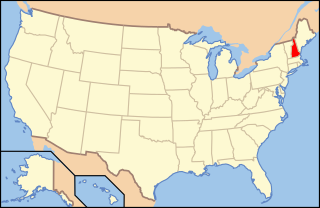Related Research Articles
Capital punishment was abolished in 2019 in New Hampshire for persons convicted of capital murder. It remains a legal penalty for crimes committed prior to May 30, 2019.
In the United States, the law for murder varies by jurisdiction. In many US jurisdictions there is a hierarchy of acts, known collectively as homicide, of which first-degree murder and felony murder are the most serious, followed by second-degree murder and, in a few states, third-degree murder, which in other states is divided into voluntary manslaughter, and involuntary manslaughter such as reckless homicide and negligent homicide, which are the least serious, and ending finally in justifiable homicide, which is not a crime. However, because there are at least 52 relevant jurisdictions, each with its own criminal code, this is a considerable simplification.
Murder in Alaska law constitutes the intentional killing, under circumstances defined by law, of people within or under the jurisdiction of the U.S. state of Alaska.
Murder in Pennsylvania law constitutes the intentional killing, under circumstances defined by law, of people within or under the jurisdiction of the U.S. state of Pennsylvania.

Gun laws in New Hampshire regulate the sale, possession, and use of firearms and ammunition in the state of New Hampshire in the United States. New Hampshire's gun laws are amongst some of the most permissive in the United States; while the state has not had a mass shooting event since 1982, its per capita gun death rate, the 9th lowest gun death rate of the 50 states, is double neighboring Massachusetts, which has among the strictest gun laws in the U.S. This is driven entirely by a difference in suicide rates between New Hampshire and Massachusetts, since New Hampshire also has the lowest per capita murder rate of any state, which is less than half the per capita murder rate in Massachusetts.
Murder in Arizona law constitutes the intentional killing, under circumstances defined by law, of people within or under the jurisdiction of the U.S. state of Arizona.
Murder in Colorado law constitutes the unlawful killing, under circumstances defined by law, of people within or under the jurisdiction of the U.S. state of Colorado.
Murder in Florida law constitutes the intentional killing, under circumstances defined by law, of people within or under the jurisdiction of the U.S. state of Florida.
Murder in Kentucky law constitutes the intentional killing, under circumstances defined by law, of people within or under the jurisdiction of the U.S. state of Kentucky.
Murder in Oregon law constitutes the intentional killing, under circumstances defined by law, of people within or under the jurisdiction of the U.S. state of Oregon.
Murder in Texas law constitutes the intentional killing, under circumstances defined by law, of people within or under the jurisdiction of the U.S. state of Texas.
Murder in Vermont law constitutes the intentional killing, under circumstances defined by law, of people within or under the jurisdiction of the U.S. state of Vermont.
Murder in Wyoming law constitutes the intentional killing, under circumstances defined by law, of people within or under the jurisdiction of the U.S. state of Wyoming.
Murder in Delaware law constitutes the unlawful killing, under circumstances defined by law, of people within or under the jurisdiction of the U.S. state of Delaware.
Murder in Connecticut is defined as the intentional killing, under circumstances defined by law, of people within or under the jurisdiction of the U.S. state of Connecticut. The United States Centers for Disease Control and Prevention reported that in the year 2021, the state had a murder rate somewhat below the median for the entire country.
Murder in Indiana law constitutes the intentional killing, under circumstances defined by law, of people within or under the jurisdiction of the U.S. state of Indiana.
Murder in Minnesota law constitutes the killing, under circumstances defined by law, of people within or under the jurisdiction of the U.S. state of Minnesota.
Murder in New York law constitutes the unlawful killing, under circumstances defined by law, of people within or under the jurisdiction of the U.S. state of New York. Because the criminal law of the state also governs the City of New York, there is not a separate law applicable to murders committed in the city.
References
- ↑ "National Center for Health Statistics: Homicide Mortality by State". Centers for Disease Control and Prevention. February 16, 2021. Retrieved September 24, 2021.
- ↑ Bonnie, Richard J.; Coughlin, Anne M. (2004). Criminal Law (2nd ed.). Foundation Press. p. 860. ISBN 978-1-58778-720-1.
- ↑ "CHAPTER 630 HOMICIDE". www.gencourt.state.nh.us.
- ↑ "New Hampshire Statutes - Table of Contents". Gencourt.state.nh.us. Retrieved August 2, 2012.
- ↑ "New Hampshire Statutes, Sec. 630:4 Causing or Aiding Suicide". New Hampshire General Court. Retrieved July 18, 2017.
- ↑ Cohen, Jonathan (2007). "The Student Guide To N.H. Criminal Law" (PDF). Franklin Pierce University. Archived from the original (PDF) on May 21, 2013. Retrieved July 18, 2017.